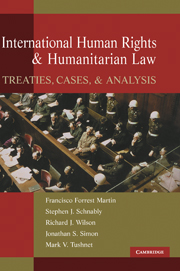Book contents
- Frontmatter
- Contents
- TABLE OF SELECTED AUTHORITIES
- PREFACE
- 1 AN OVERVIEW OF INTERNATIONAL HUMAN RIGHTS AND HUMANITARIAN LAW DEVELOPMENT AND THEIR PROTECTION MECHANISMS
- 2 FORMAL SOURCES AND PRINCIPLES OF INTERNATIONAL HUMAN RIGHTS AND HUMANITARIAN LAW
- 3 INCORPORATION OF INTERNATIONAL HUMAN RIGHTS AND HUMANITARIAN LAW IN U.S. LAW
- 4 INTERNATIONAL HUMAN RIGHTS TRIBUNAL PROCEDURE AND REMEDIES
- 5 SUBSTANTIVE INTERNATIONAL HUMAN RIGHTS AND HUMANITARIAN LAW PROTECTIONS
- 6 THEORY AND CRITIQUE
- INDEX
4 - INTERNATIONAL HUMAN RIGHTS TRIBUNAL PROCEDURE AND REMEDIES
Published online by Cambridge University Press: 05 June 2012
- Frontmatter
- Contents
- TABLE OF SELECTED AUTHORITIES
- PREFACE
- 1 AN OVERVIEW OF INTERNATIONAL HUMAN RIGHTS AND HUMANITARIAN LAW DEVELOPMENT AND THEIR PROTECTION MECHANISMS
- 2 FORMAL SOURCES AND PRINCIPLES OF INTERNATIONAL HUMAN RIGHTS AND HUMANITARIAN LAW
- 3 INCORPORATION OF INTERNATIONAL HUMAN RIGHTS AND HUMANITARIAN LAW IN U.S. LAW
- 4 INTERNATIONAL HUMAN RIGHTS TRIBUNAL PROCEDURE AND REMEDIES
- 5 SUBSTANTIVE INTERNATIONAL HUMAN RIGHTS AND HUMANITARIAN LAW PROTECTIONS
- 6 THEORY AND CRITIQUE
- INDEX
Summary
Jurisdiction
Generally speaking, for an international human rights tribunal to have jurisdiction (called “competence” in international law) over a case, the following requirements must be met:
(i) the state respondent must have ratified the treaty and any protocols recognizing the competence of the tribunal to decide the case;
(ii) the state respondent must have ratified the treaty before the alleged human rights violations occurred;
(iii) the complainant is alleging violations of rights from which the state party has not derogated during a state of emergency, nor of which the state party has made reservations;
(iv) the complainant has exhausted or constructively exhausted domestic remedies;
(v) the complaint has been filed within the prescribed time from the date of exhausting domestic remedies; and
(vi) the subject-matter of the complaint is not pending before another international proceeding.
Other requirements can include that the complaint not be anonymous, that the complaint include the complainant's profession and domicile, that the complaint not be based exclusively on news media reports, and/or that the complaint not use insulting language.
There are exceptions to these general rules, which will be discussed in greater detail. Concerning exhaustion of domestic remedies, the absence of legal aid and unreasonably prolonged domestic proceedings constructively exhaust. Reservations cannot be inconsistent with the object and purpose of the treaty. The subject matter of a complaint can be pending before another international proceeding if that proceeding does not have the character of a human rights tribunal.
- Type
- Chapter
- Information
- International Human Rights and Humanitarian LawTreaties, Cases, and Analysis, pp. 270 - 306Publisher: Cambridge University PressPrint publication year: 2006



